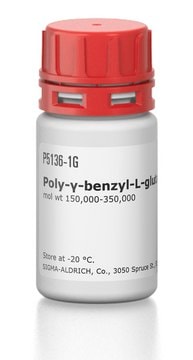P5386
Poly-γ-benzyl-L-glutamate
mol wt 70,000-150,000
Synonym(s):
PBLG
About This Item
Recommended Products
form
powder
Quality Level
mol wt
70,000-150,000
color
white to light yellow
storage temp.
−20°C
InChI
1S/C12H15NO4/c13-10(12(15)16)6-7-11(14)17-8-9-4-2-1-3-5-9/h1-5,10H,6-8,13H2,(H,15,16)/t10-/m0/s1
InChI key
BGGHCRNCRWQABU-JTQLQIEISA-N
Looking for similar products? Visit Product Comparison Guide
Application
- Hydrogen bond formation may enhance RDC-based discrimination of enantiomers.: This research explores the impact of hydrogen bond formation on residual dipolar couplings (RDC) in the discrimination of enantiomers. Poly-y-benzyl-L-glutamate (PBLG) is used as a chiral alignment medium, enhancing the sensitivity and resolution of NMR spectroscopy for enantiomeric analysis (Sager et al., 2024).
- Potential and performance of anisotropic (19)F NMR for the enantiomeric analysis of fluorinated chiral active pharmaceutical ingredients.: This study highlights the use of PBLG as an alignment medium in anisotropic 19F NMR spectroscopy for analyzing chiral pharmaceutical compounds. The research demonstrates improved enantiomeric discrimination and quantification, crucial for pharmaceutical development (Gouilleux et al., 2024).
- Block Sequence Effects on the Self-Assembly Behaviors of Polypeptide-Based Penta-Block Copolymer Hydrogels.: This study investigates the self-assembly behavior of block copolymer hydrogels containing PBLG. The research shows how block sequence affects the mechanical properties and potential applications of these hydrogels in biomedical fields (Wang et al., 2024).
- Liquid crystalline composite hydrogels with large pH-triggered anisotropic swelling for embolotherapy.: This research explores the development of liquid crystalline hydrogels incorporating PBLG for use in embolotherapy. The hydrogels demonstrate significant pH-responsive swelling, making them suitable for targeted medical applications (Zhang et al., 2024).
Analysis Note
Other Notes
Storage Class Code
11 - Combustible Solids
WGK
WGK 3
Flash Point(F)
Not applicable
Flash Point(C)
Not applicable
Personal Protective Equipment
Certificates of Analysis (COA)
Search for Certificates of Analysis (COA) by entering the products Lot/Batch Number. Lot and Batch Numbers can be found on a product’s label following the words ‘Lot’ or ‘Batch’.
Already Own This Product?
Find documentation for the products that you have recently purchased in the Document Library.
Articles
Humankind has utilized protein materials throughout its existence, starting with the use of materials such as wool and silk for warmth and protection from the elements and continuing with the use of recombinant DNA techniques to synthesize proteins with unique and useful properties.
Our team of scientists has experience in all areas of research including Life Science, Material Science, Chemical Synthesis, Chromatography, Analytical and many others.
Contact Technical Service







